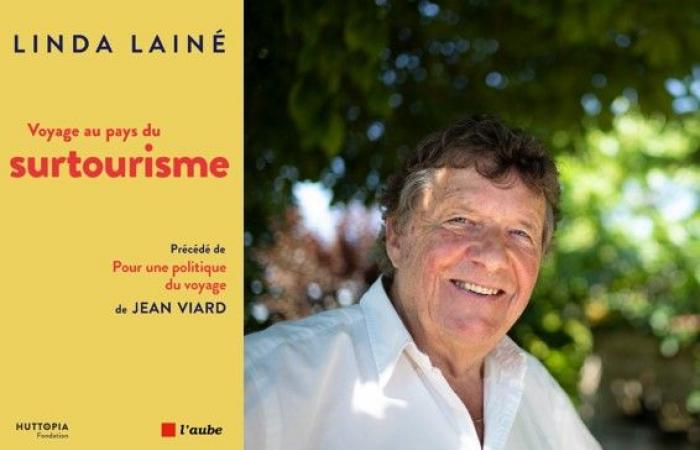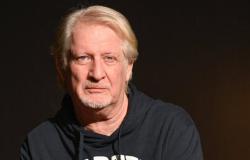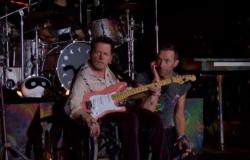
It is the creator of this publishing house, the sociologist Jean Viard, who for half a century has been scrutinizing our habits and customs, deciphering and dissecting our excesses, who prefaces this book and proposes his “Politics of travel – A threat – Solutions”. He does so in about thirty pages, ahead of the study by Linda Lainé, editor-in-chief of the magazine L’Echo touristique.
He begins with a provocation: “There are not enough tourists”, when the Vauclusiens wait behind mobile homes which drive at 20km/h on the rise of Ventoux or when they queue for long minutes, at Avignon, on the banks of the Rhône, at the traffic light which allows access to the Palais des Papes car park but only allows three cars to pass at a time under the blazing sun during ‘In’ or ‘Off’.
Jean Viard continues: “Only one billion Earth brothers cross a border each year. There were 60 million in 1968. I dream of them becoming 3 billion. This openness may seem counterproductive, however, before debating the ecological, cultural and social impacts of travel, we must remember that travel, in our modern societies, is what makes us citizens of France. Previously, societies and nations came together through religious worlds or empires, and one could live for centuries without knowing the existence of America or Africa. »
He continues: “Travel, the discovery of others, of the diversity of cultures and ecosystems, is what integrates us into society and the world. But it is because we share common humanity that we will win the climate war.” He looks back on the pandemic episode of 2019. “5 billion people fought together to defeat Covid. Everyone changed their behavior, traveled less, reorganized economic circuits and we realized that together we could win a global battle. »
Among the consequences of confinement, he cites a few examples: “A billion children were taken out of schools, 48% of Americans left their jobs, 10% of Chinese divorced, in France a million couples separated, 25 % of employees have switched to or teleworked. Countless urban dwellers have left the city or are staying longer in their second homes and Airbnbs. » In short, the pandemic has changed our outlook, our life, our way of considering the world, society has evolved.
More tourism but less overtourism
It is at this point that Jean Viard explains his demonstration, weighing the percentage between risks and benefits. “We need more tourists if we want to create a united society, bring together different groups (of origin, culture, income, regions), we must help those who cannot go on vacation. However, 30 to 40% of French people do not travel, especially young people from ‘neighborhoods’ who experience this house arrest as an exclusion from common values.”
But to avoid overtourism, crowds and traffic jams when you go to St-Tropez in the morning and leave Madrague, the Gendarmerie Museum dear to Louis de Funès or the Place des Lices in the evening, you have to -gu-ler, he insists. “We must divide the flows digitally as in the Calanques where we retain our entry on the internet to visit Sugiton in Marseille or Sormiou in Cassis. Before, 2,000 tourists came to trample the flora every day to contemplate the imposing Cap Canaille, a massacre for the ecosystem. What’s the charm? We limited it to 400 people. People are happy to have free access to a luxury and appreciate being few in number in this dream place. » Holidays must be spread out over the year, over the four seasons.
“The work of tourism professionals is to enrich culture, to create the possibility of encounters with art and music. Bringing culture to places of popular practice is a major challenge. The 7 million French people who attend festivals in the summer are not always people who go to shows during the year. » Not without humor, Jean Viard quotes one of his colleagues, Jean-Didier Urbain, the sociologist specializing in tourism: “There are two places of great density on the planet: cemeteries and beaches. »
In his preface, Jean Viard concludes: “The question posed to us today is that of our ability to build a common strong enough to win the low-carbon battle of the living industry and the reuse economy. . Tourism to be regulated but protected in a civilization of travel and discovery. »
More reasoned tourism
It is then that Linda Lainé begins her demonstration: “They have long been desired and pampered for the windfall they represent, but tourists in too tight rows are no longer welcomed with open arms. Venice, New York, Barcelona or Dubrovnik are asking questions and regulating. Local populations feel asphyxiated. »
While the 80th Anniversary of the 1944 Landings in Normandy, the cycling Tour de France, the Olympic and Paralympic Games and festivals are tourism highlights this summer, as France will attract more than 100 million visitors, Vaucluse more of 4 million, the editor-in-chief of L’Echo tourisme, Linda Lainé, recommends being “travel actors”. To participate in the preservation of the environment, the improvement of local life, light years away from predatory tourism. As for “restorative” tourism leaving the place visited in a better state than when it arrived, it could take root in its turn. “We have so many wounds to heal on our splendid planet. Let’s travel mindfully. »
Journey to the land of overtourism – Editions de l’Aube – €17
331 Rue Amédée Giniès. The Tower of Aigues. 04 90 07 46 60.





